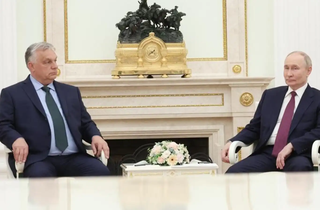Following their meeting on Friday, Putin described the discussions as "frank and useful," focusing primarily on the ongoing conflict in Ukraine. Despite the talks, Putin reiterated Moscow's stance that any negotiations concerning Ukraine should be based on its peace proposals.
Putin expressed gratitude to Orban for his efforts to facilitate dialogue between Russia and Europe, noting Kyiv's continued reluctance to cease hostilities. Orban emphasized the need for "many steps" to end the Russia-Ukraine war, stating, "We took the first step to restore dialogue," while acknowledging significant differences between Kyiv and Moscow.
Orban's visit to Moscow came shortly after his meeting with Ukrainian President Volodymyr Zelenskyy in Kyiv. As Hungary currently holds the rotating EU presidency, Orban aims to advocate for peace in Ukraine, which has been embroiled in conflict since Russia's 2022 invasion.
During televised remarks at the meeting, Putin suggested that Orban represented the European Council, despite objections from various European officials condemning the visit. "I understand that this time you have come not just as our longstanding partner but as president of the council," Putin remarked, expecting Orban to convey the "position of European partners" on Ukraine.
However, EU foreign affairs chief Josep Borrell clarified that Orban had not received a mandate from the EU for the Moscow visit, categorizing it strictly within the framework of bilateral relations between Hungary and Russia.
Hungary, heavily dependent on Russian energy imports, particularly natural gas, approaches Russia cautiously to maintain energy security. As a member of both the European Union (EU) and NATO, Hungary aligns with collective positions on sanctions and diplomatic efforts. However, it has at times shown reluctance to impose severe sanctions on Russia, balancing economic interests with broader European and transatlantic policies.
Hungary maintains diplomatic relations with Russia, advocating dialogue and diplomacy to resolve conflicts, sometimes diverging from more assertive stances taken by other EU and NATO members.
In response to the humanitarian crisis, Hungary has provided aid to Ukraine, especially in hosting refugees fleeing conflict zones, highlighting its humanitarian approach amidst the crisis.
Overall, Hungary's stance on the Russia-Ukraine war is shaped by economic ties with Russia, EU and NATO memberships, and a diplomatic strategy focused on dialogue and humanitarian assistance. (ILKHA)



 Dünya
Dünya
 Dünya
Dünya
 Dünya
Dünya
 Dünya
Dünya
 Dünya
Dünya
 Güncel
Güncel
 Dünya
Dünya
 Dünya
Dünya
 Güncel
Güncel
 Dünya
Dünya





